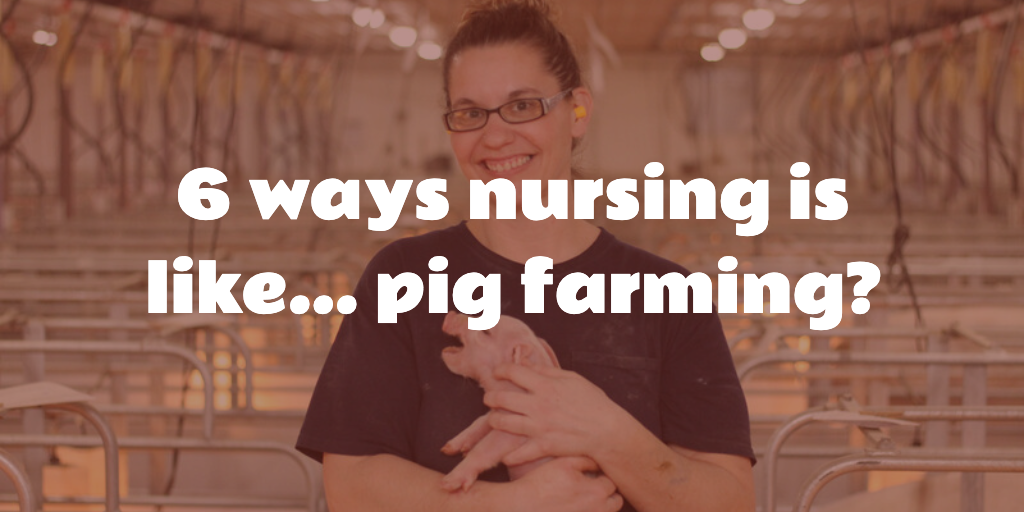It’s not often we get to link to Pork Business for relevant nursing content, but when the time is right, it’s right! The website that proclaims itself the leading website in “pork communications” published a story with an unexpected angle last Friday, and it’s too unusual to pass up: 6 Ways Pig Farming is Like Nursing (yes, you heard that right).
So how did they come to that eyebrow-raising headline? Ask Andrea Graves. She was a certified nursing assistant for 20 years before taking a job at a sow farm in Iowa. Unexpected? Maybe. But if nurses can become crocodile catchers or underwater photographers, and police officers and brick makers can become nurses, why not? Plus, Andrea’s not just any health care professional who made an unusual career change.
After a year on the job helping sows give birth and caring for piglets, Andrea hasn’t just been promoted to newborn pig specialist and farrowing department head (yeah, we had to look it up too), she’s also able to draw some pretty on-point lessons on how pig care really is actually just like nursing:
“Between the washing, drying and disinfecting of rooms to the water checks, heat lamp placements and recordkeeping, she started to realize there were more similarities than differences between her old job and new.”
You’ve got to read the article to fully appreciate her reasoning, but here’s the bullet point version… and we think they hold up pretty well for LPNs and RNs as well!

1— Your hours are routine, your day is crazy.
Andrea and her team “know exactly what to do by what time and in what order, working their way through the farrowing rooms and ticking off hundreds of daily tasks”. She completes 3-4 rounds a day, “spending her time training, moving animals, keeping the farm manager updated [and] imputing records on the computer”.
2— You consistently and carefully adhere to protocols.
Just like in nursing, “tasks are done according to specific protocols with procedure, safety, and cleanliness front of mind”. Graves: “We are responsible for following these steps precisely, each and every time”.
3— You see it all.
“Neither career is void of all things squishy, messy and downright gross at times”. Graves: “You get over it really fast and recognize it’s all part of the job. Things happen and then you clean it up.”’
4— If something looks and feels wrong, you get help.
“If something doesn’t feel right to us, we let our manager know… We’re not expected to always know what to do, but we’re expected to speak up on behalf of those in our care”.
5— You never, ever stop learning.
“At the NICU, we welcomed new and improved equipment and learned better ways to provide enhanced patient care and we do the same thing in the barn… We are always trying new things to improve animal care.”
6— You demonstrate compassion, always.
“When I worked in healthcare we had a code we lived by, and that was to treat every patient with dignity, compassion and respect. We also have our own code as pig caretakers and that’s to take care of the pig’s basic needs to the very best of our abilities”
So, what do you think? Just a couple of years ago, Andrea “tended to babies during their first, critical days of life,” now she’s busy getting new piglets “warm, dry and suckling colostrum”. Similar thing, really? We think it could be.. at least as long as you overlook the slight distinction that the piglets will eventually be eaten!
